The Election Game
Starting as far back as 2006, this website was touting its allure for those folks who were interested in elections and their outcome. This latest iteration is from the site's 2012-2015 archived files. Enjoy the site with its archived content. You can still get the free app to download on Amazon. But let's face it, LOTS of things have changed politically since 2015 and the game will feel dated.

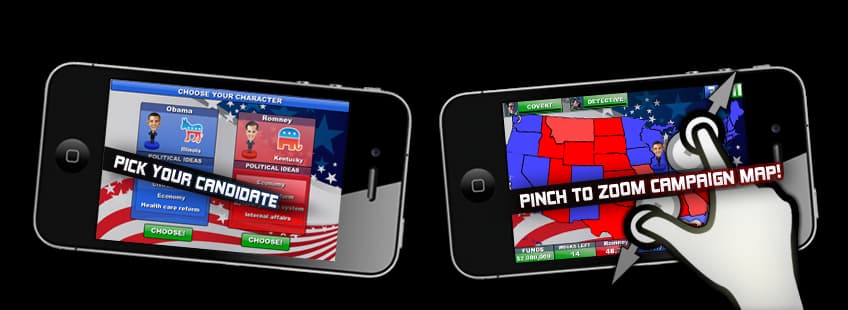
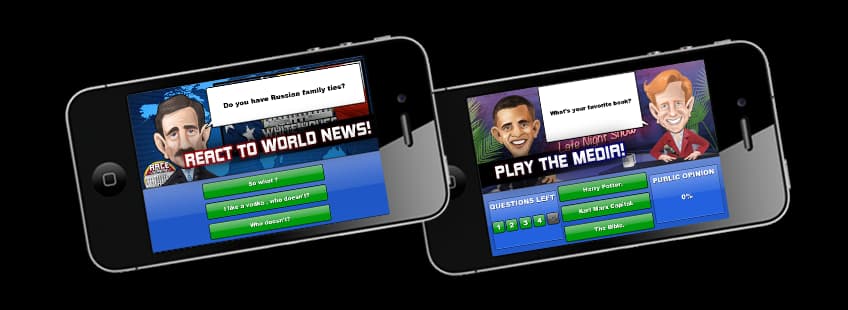
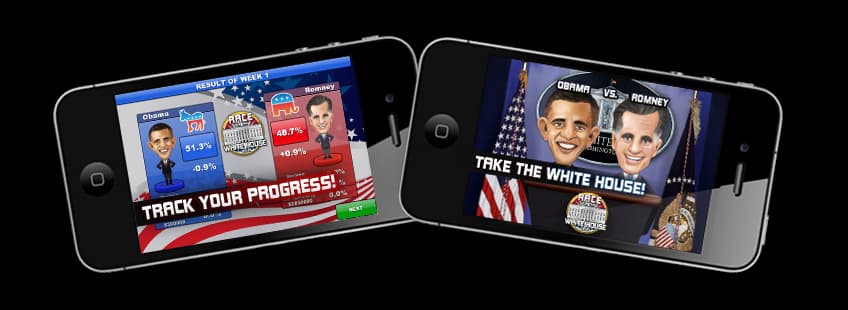
Do you have what it takes to become the next president of the United States?
Election Game 2012: Race for the White House for iPhone, iPad, and Android phones or talbets puts you in the political hot seat and allows you to manage your own election campaign.
Raise funds and spend your cash on advertisement, make television appearances to charm the public, or run secret covert operations to outmaneuver your opponent.
These are just a few of the options this election game has to offer.
Game Quick Overview:
- Fun strategy game-play
- Pick your own candidate
- Pinch to zoom campaign map
- Appear on TV shows
- React to humorous world news
- Run advertisement campaigns
- Rally volunteers
- Fund raising
- Dig for dirt on your opponent (dirty politics)
- Run secret covert operations (smear your opponent)
Pick your favorite candidate (Barack Obama or Mitt Romney) and get your election campaign started. The pinch to zoom US campaign map allows you to navigate and travel the states and set your campaign priorities.
As in real politics tough decisions need to be made and calculated risks need to be taken. Accept risky funds that might result in a scandal or go on the offensive and dig for dirt on your opponent. You'll quickly learn that in today's politics no campaign is won without dirty tricks and secret operations.
Get your free copy of this fun strategy game today for your iPhone, iPad, or Android devices and get your camaign started!
Race for the White House - How to play
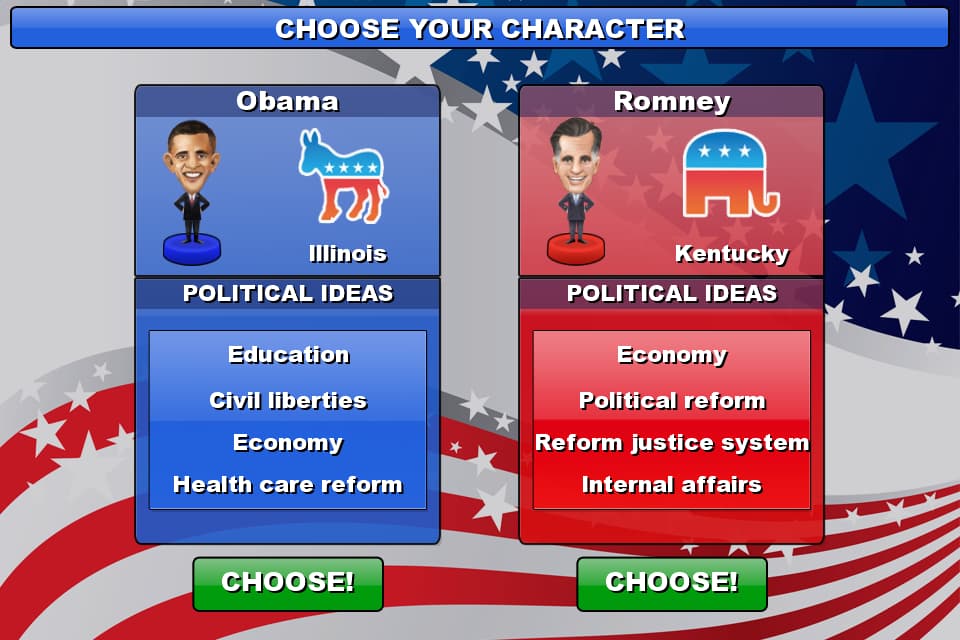
1. Choose your candidate.
This also determines what party (Democrat / Republican) you join.
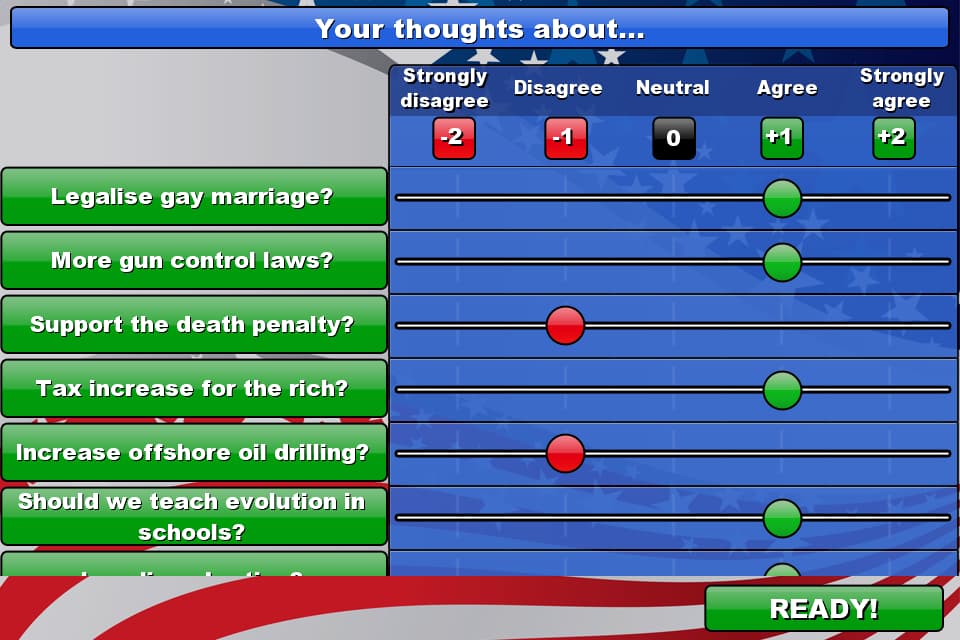
2. What do you think about these issues?
Move the slider so that it corresponds with your opinion. This has a big influence on your popularity.
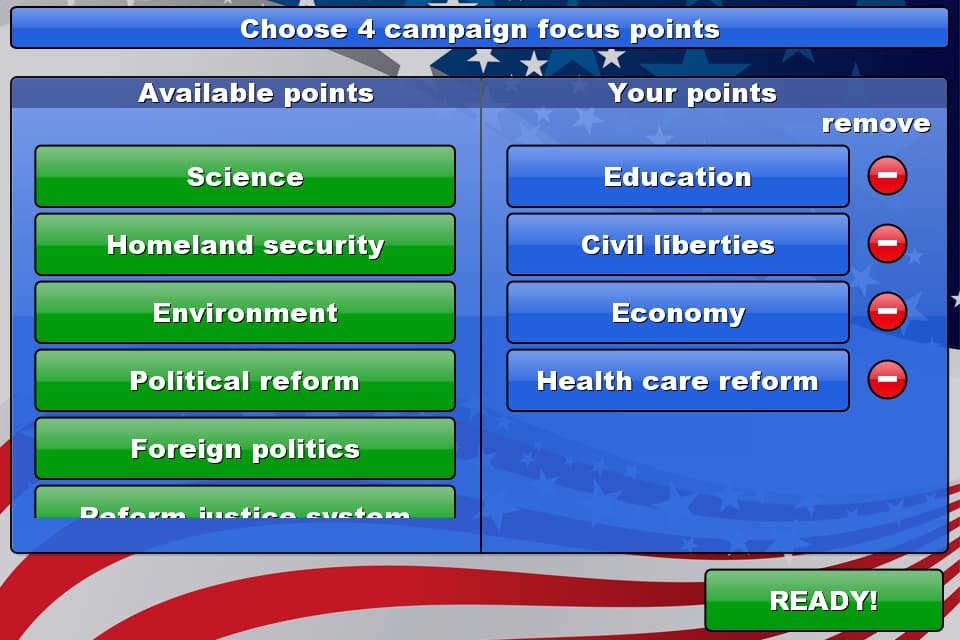
3. Pick 4 campaign points.
These are the main focus points of your campaign.
4. This concludes the start-up phase.
Let's start the campaign.
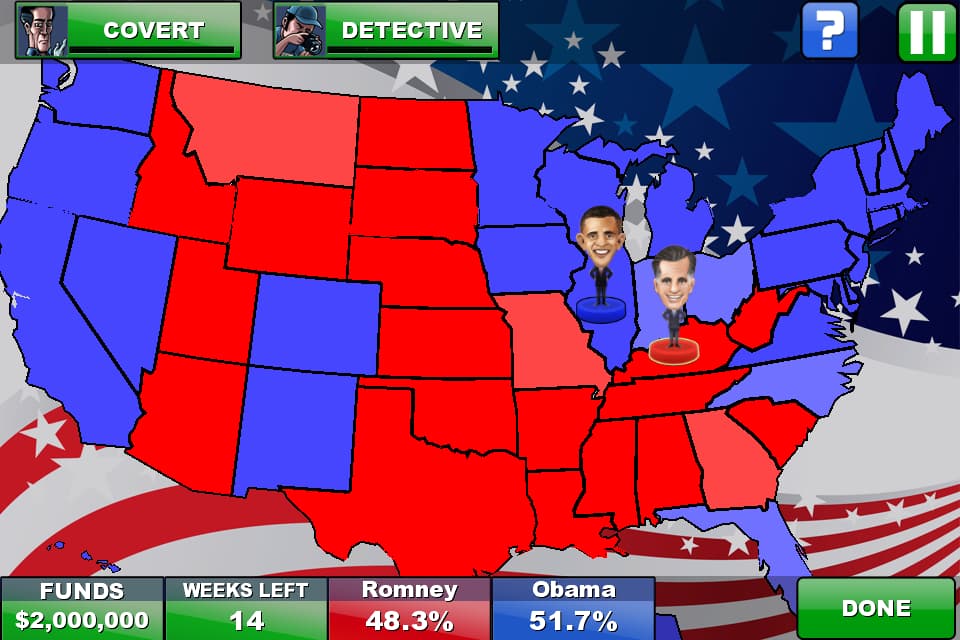 5. The map Screen.
5. The map Screen.
The map screen is the place where all the action takes place.
Your character will start in his home state.
The map will have different colors.
Red stands for Republican, blue for Democrats and grey means that it's a swing state. The goal of the game is to win the election in more states than your opponent.
How do you win votes in a state?
There are various things you can do to win votes and take the White House, which include:
1- Make money, lots of money (fund raising & volunteers);
2- Buy ads in a state;
3- Go on a talk show;
4- Cheat and lie using the detective or covert agent;
Make Money Money is everything in the campaign.
With money you can buy ads, rally volunteers and start investigations.
How do I raise some money?
At the start of a week you can choose between a number of funding offers.
Choose wisely because the more money a fund generates the more likely it will get you in trouble (scandals).
Every fund will have an indication how save / risky it is.
You can also choose the save option "hold fundraiser banquet ", but you don't know how much money you receive and it's typically not that much!
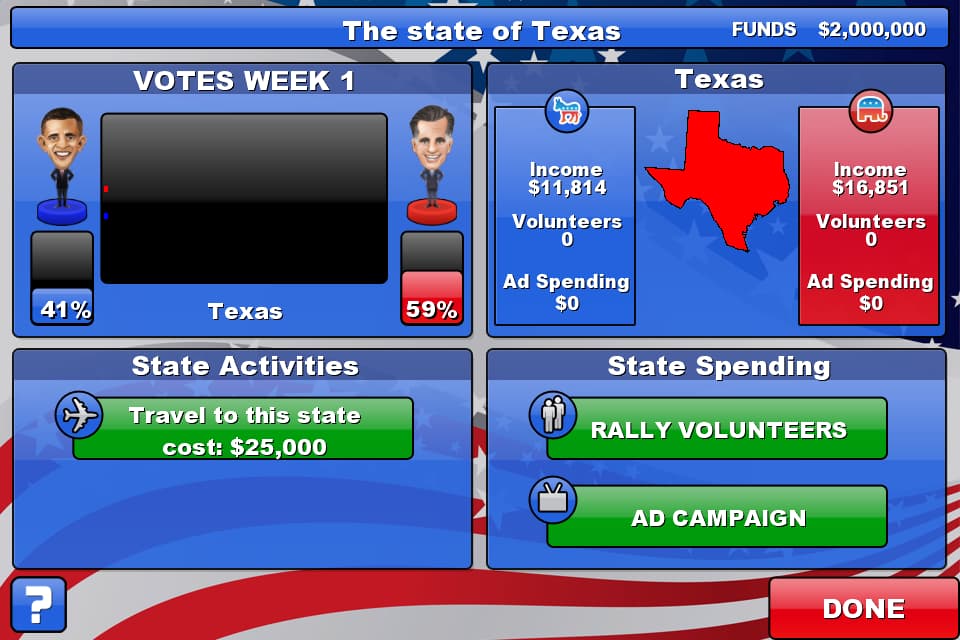
6. Rally volunteers
Another great way to make money is to rally volunteers.
Volunteers use their manpower to make calls in a state and ask for donations.
The more volunteers you recruit the more money you earn!
Tip: Rally volunteers in states that you are popular and have a large population.
Buy ads
Let's start with buying ads. In a turn (week) you can visit all states and invest in ads in every state.
The more money you invest in a state the more votes you get in that state.
Make sure you are spending more money on ads than your opponent does.

7. Use the talk show
You can visit a talk show in the state you are currently in. Visiting a talk show can only be done once every turn (week). The outcome of the talk show can be positive or negative so watch out!
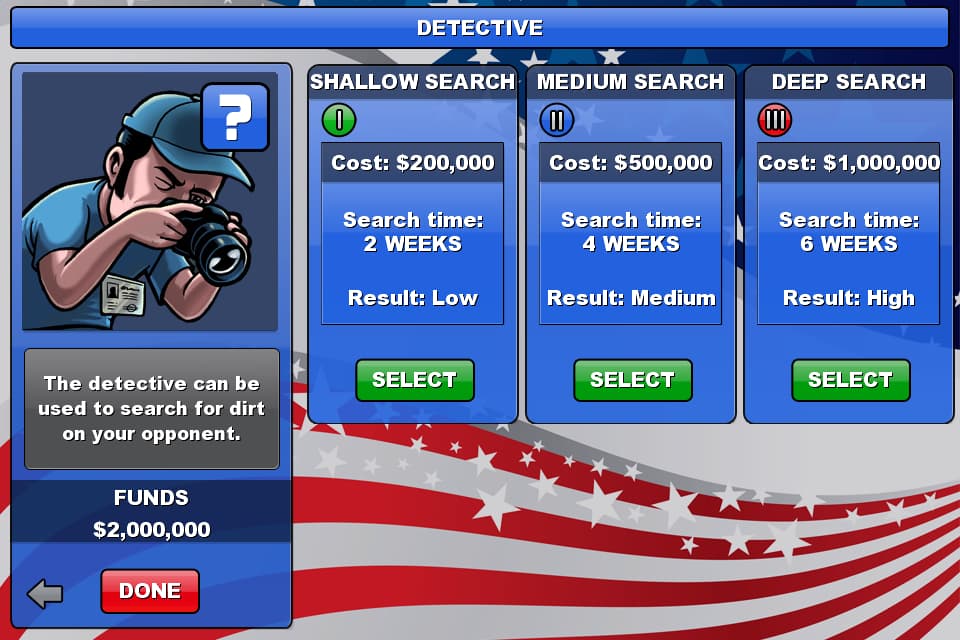
8. Detective and Covert.
Are you struggling to beat your opponent?
There is always a way, maybe it's not exactly clean, but it works! Use the detective and the covert agent to play dirty.
The detective will find the dirt you need. What is your opponent hiding? It takes some money and some time but he will find something you can use against your opponent. The deeper you dig the higher the reward will be.
If that's not enough you can always cheat! Use the covert agent to plant something incriminating and leak it to the press. Your votes will rise and victory is just around the corner! The more money you spend the greater the result.
F.A.Q.
"What do volunteers do?"
They raise money in a state.
"Why should I buy ads?"
Ads generate votes, the more votes the better.
"What do the colors of the map represent?"
Red = Republican: blue = Democrat: grey = swing state
"How long is the campaign?"
15 weeks (turns)
"What do I gain by doing a talk show?"
You can gain up to 5% +votes in the state your are in (you can also loose votes!)
"Why does the cost of travel fluctuate"
The further you travel the more money is cost to get there.
"What purposes have the covert and detective buttons?
With the covert and detective buttons extra actions can be bought.
Like an investigation or an illegal action. Try it out and see what will happen.
"I cannot start the talk show, help!"
Your candidate has to be in the same state where you want to start the talk show. And you can only do one talk show every week (turn).
More Background on Election-Game.com
Election-Game.com is a website hosting a political simulation game that puts players in the role of a U.S. presidential candidate, challenging them to manage all aspects of a campaign. This article provides a comprehensive overview of Election-Game.com, including its background, gameplay, reception, audience, and cultural significance, based exclusively on external sources and without referencing content from Election-Game.com or the attached file.
Background and Concept
Election-Game.com is part of a genre of political simulation games that have evolved over several decades. These games aim to replicate the experience of running for office, typically focusing on the U.S. presidential election. Players are tasked with making strategic decisions regarding campaign issues, resource allocation, media appearances, and sometimes even engaging in ethically questionable tactics to outmaneuver opponents.
Political simulation games date back to the 1980s, with early examples such as "The Election Game" for the Commodore 64. These early games were often criticized for their lack of engaging gameplay and simplistic mechanics, but they laid the groundwork for more sophisticated titles in later years.
Gameplay and Features
Election-Game.com offers a blend of strategy, resource management, and political maneuvering. While direct reviews of this specific game are limited, the general features of political simulation games in this genre typically include:
-
Candidate Selection: Players choose a candidate, often representing major political parties, which influences campaign strategy and voter demographics.
-
Issue Positioning: Players set their stances on key political issues to maximize appeal among various voter groups.
-
Resource Management: Fundraising, advertising, and volunteer coordination are central to building campaign momentum.
-
State-by-State Strategy: Players must decide how to allocate resources across states, with special attention to swing states that can determine the election outcome.
-
Media and Public Relations: Making appearances on talk shows, running advertisements, and managing scandals are all part of the campaign.
-
Covert Operations: Some games, including Election-Game.com, allow for "dirty tricks" such as investigations or smear campaigns, adding an ethical dimension to strategic choices.
These mechanics mirror real-world campaign strategies and provide a hands-on understanding of the complexities involved in electoral politics.
Industry Context and Similar Games
Election-Game.com is one of many games in the political simulation genre. Notable examples include:
-
iCivics' "Win the White House": An educational game used in classrooms to teach students about campaign strategies and the Electoral College.
-
POLITICO’s Campaign Manager Game: A data-driven simulation where players allocate resources and make decisions to win the 2024 U.S. presidential election.
-
Election Lab: An educational platform designed to help students understand the Electoral College and campaign dynamics.
-
270 | Two Seventy US Election: A mobile game with mechanics similar to Election-Game.com, focusing on candidate selection, campaign strategy, and winning electoral votes.
These games are used both for entertainment and educational purposes, often praised for their ability to engage users with the political process in an interactive way.
Reviews and Reception
While there are few direct reviews of Election-Game.com, the reception of similar games provides insight into its likely strengths and weaknesses:
-
Positive Aspects: Players often appreciate the strategic depth, the ability to simulate real-world campaign scenarios, and the educational value of understanding electoral mechanics.
-
Criticisms: Some games in this genre have been criticized for repetitive gameplay, lack of dynamic content, and user interface issues. For example, the Commodore 64 "Election Game" was described as "lifeless" and "tedious," with minimal graphics and repetitive mechanics.
-
Modern mobile games like "270 | Two Seventy US Election" receive mixed reviews, with some users praising the challenge and variety, while others complain about paywalls and limited free content.
Press and Media Coverage
Political simulation games occasionally attract media attention, particularly when they intersect with real-world political events or are used for educational purposes. For instance, Deutsche Welle has reported on how video games, including political simulations, are increasingly used as platforms for political messaging and activism, highlighting their potential to influence political engagement and awareness.
Educational games like those offered by iCivics have been widely covered in the press for their role in civics education, being used in thousands of classrooms across the United States.
Audience
The audience for Election-Game.com is diverse, including:
-
Politically Engaged Individuals: People interested in politics and strategy games.
-
Students and Educators: Teachers use these games to supplement civics education and make learning about elections more engaging.
-
Casual Gamers: Those looking for a unique strategy game experience with a political twist.
The game's focus on U.S. presidential elections makes it particularly appealing to American audiences and those interested in American politics.
Cultural and Social Significance
Political simulation games like Election-Game.com play an important role in demystifying the electoral process and encouraging political literacy. By allowing players to experience the challenges and decisions faced by real candidates, these games foster a deeper understanding of campaign strategy, voter behavior, and the impact of media and public relations.
The inclusion of "dirty politics" and covert operations in gameplay reflects a cultural recognition of the sometimes ruthless nature of political campaigns. This not only adds a layer of realism but also prompts players to consider the ethical dimensions of political competition.
Games in this genre are also part of a broader trend of gamifying education and social issues, making complex topics more accessible and engaging for younger audiences.
Examples and Educational Use
Several educational platforms and games share similar goals and mechanics with Election-Game.com:
-
Election Lab: Used in classrooms to teach students about the Electoral College and campaign strategy, praised for its research-based approach.
-
POLITICO’s Campaign Manager Game: Simulates the 2024 U.S. presidential election, allowing players to make strategic decisions based on real data.
-
iCivics’ "Win the White House": Focuses on campaign management and voter persuasion, with extensive teaching resources for educators.
-
Election Madness: A prediction game created by a political science professor to engage students with real election outcomes.
These examples demonstrate the educational potential of political simulation games and their growing role in both classrooms and popular culture.
Social Impact and Engagement
Political simulation games contribute to increased political engagement by making the electoral process interactive and understandable. They encourage critical thinking about campaign strategy, voter outreach, and the ethical implications of political decisions.
By gamifying politics, these platforms help bridge the gap between entertainment and education, making civics more appealing to a broader audience. This is particularly significant in an era where traditional civics education is often seen as dry or inaccessible.
However, the portrayal of negative campaign tactics in these games also raises questions about the normalization of unethical behavior in politics. While this adds realism, it is important for players to critically engage with the ethical choices presented.
Election-Game.com offers a comprehensive political simulation experience, challenging players to navigate the complexities of a U.S. presidential campaign. While it shares many features with other games in the genre, its focus on both strategic and ethical decision-making sets it apart.
Though direct reviews are limited, the broader context of political simulation games suggests that Election-Game.com appeals to a diverse audience interested in politics, strategy, and education. Its cultural significance lies in its ability to make the electoral process accessible, engaging, and thought-provoking.
As political games continue to evolve, Election-Game.com exemplifies the potential for interactive media to educate, entertain, and inspire critical engagement with real-world issues.

